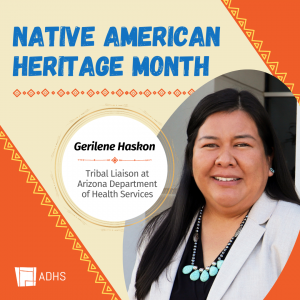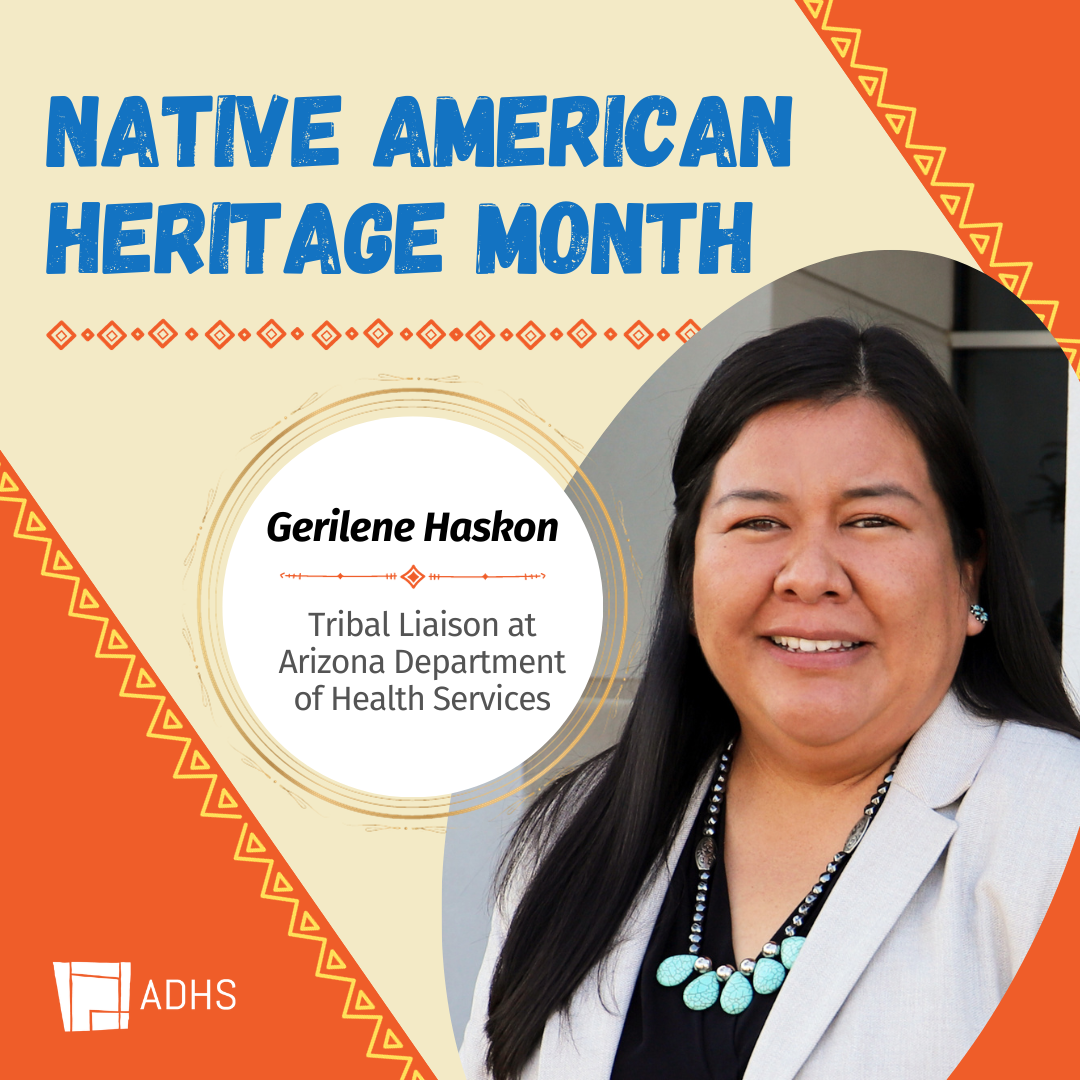 ADHS continues to celebrate Native American Heritage Month by highlighting ADHS Team Member, and Tribal Liaison, Gerilene Haskon. Geri was appointed to the role earlier this year.
ADHS continues to celebrate Native American Heritage Month by highlighting ADHS Team Member, and Tribal Liaison, Gerilene Haskon. Geri was appointed to the role earlier this year.
She attended the University of Arizona for a bachelor’s degree in Nutritional Sciences, followed by a Master of Public Health in Maternal and Child Health. Geri’s passion for maternal health and her care for women, seen as holy creators in Diné traditional beliefs, stems from her roots.
After college, Geri worked as a research associate for the Johns Hopkins Bloomberg School of Public Health and later took a position with Native Health as a program manager and home visiting coordinator.
Her experiences from that time were transformative and would guide her future work with home visitation and maternal care. As a research associate, she helped design and implement home visiting services for children diagnosed with Type 2 diabetes. During her time at Native Health, she gained even more experience with home visitation.
Geri first joined ADHS in 2014 as a Native American Community Coordinator in the Bureau of Women’s and Children’s Health. She was deeply aware of the need for pregnant and postpartum home visitation care that included traditional understanding.
In working with and listening to pregnant or postpartum women living in rural areas often dealing with health care provider shortages, Geri learned about gaps in care and a lack of cultural understanding.
“It’s more of that respect and understanding. For us, a lot of tribal communities, we have to show respect and come in with a positive energy because you’re walking into someone’s space, someone’s home, so providing that positive understanding is important.”
Expanding culturally appropriate care was crucial to Geri. In her role, she expanded home visiting programs to four Arizona tribal communities in less than a year.
She went on to establish the annual Strong Families Tribal Home Visiting Conference for tribal home visitors in 2018, with many tribes and home visitors from other states in attendance.
“I wanted to make sure there was a safe space for home visitors to come to that were tribally focused,” she said. “We incorporated culture, we incorporated a lot of the evidence-based programs that are very focused for tribal communities, we strengthened approaches. It was more of a healing experience, a place for other tribal members and tribal home visitors to work with one another and support one another.”
In 2020, Geri moved on from ADHS to become the Tribal Relations Coordinator at Blue Cross Blue Shield of Arizona, working to provide training to help foster cultural diversity and sensitivity. When the opportunity to become Tribal Liaison for the ADHS arose in 2023, she felt called to return to the agency and continue serving public health.
“I applied for this position because I wanted to advocate for our tribal members just like how I support my parents,” Geri said. “I’d also like to help our staff and external stakeholders learn more about our tribal communities to better support efforts at state, county, and local levels. Tribal nations are sovereign, and each tribe is different and their direct relationships are with the federal government. I’d like to continue to assist in building those meaningful relationships at the state level related to public health.”
So far, her work has focused on building relationships, conducting tribal visits, meeting counties with tribal communities, providing educational sessions and support, and serving as the lead for the ADHS tribal data workgroup to expand knowledge on indigenous data sovereignty and tribal governance.
“It’s been a humbling experience, I am stepping into a role that has been under a great person for over 20 years that I was able to receive mentorship from during my time at ADHS,” she said.
Tune in next week for part 3 of our blog series and learn more about how Geri’s upbringing impacted her professional goals.










